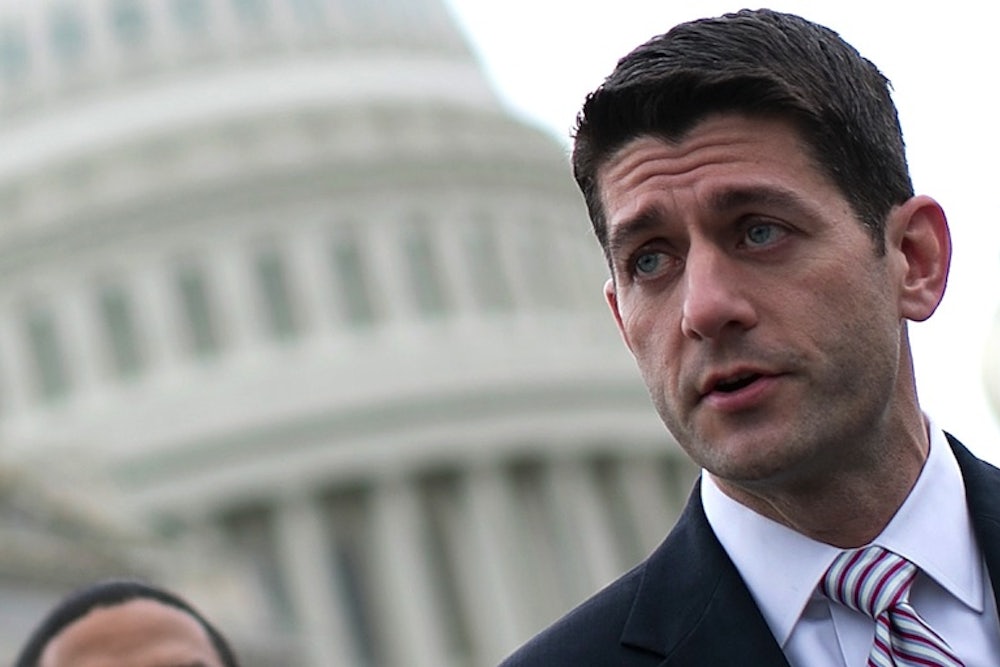Paul Ryan is about to unveil a new proposal for how the government should spend its money. According to multiple media accounts, it will look a lot like the budget plans he's produced before, the ones that famously called for radically downsizing the government. The main difference? The cuts in this proposal will be even bigger.
It seems Ryan will seek to reduce spending, and balance the budget, more quickly than he has previously. That would mean even less money for food stamps, less money for Medicaid, and many other vital programs on which low-income Americans, in particular, depend. In addition, Ryan may tweak his signature proposal, which would transform Medicare into a voucher plan and, arguably, undermine its basic guarantee of benefits. Previously, Ryan called for delaying introduction of the scheme, so that it would not affect anybody who is already 55 years old. He may now call for introducing the transformation sooner, thereby exposing more seniors to it, although media reports on that part of the proposal were particularly fuzzy.
Strictly in policy terms, introducing a new Medicare scheme one or two years earlier wouldn't be a major change. But it further undermines the Republican pledge never to change Medicare for Americans who are at or near retirement age. It also explains why more moderate Republicans aren’t happy. According to a story in The Hill, several moderate Republicans "erupted" at a recent meeting when Ryan floated the idea. "A lot of people had made commitments at 55," one lawmaker told Hooper. "In other words, in the campaign [Republican vulnerable members] said it wouldn’t affect your Medicare for retirees or near retirees for those 55 and up ... and [if] this budget forces them to renege on that, that would be problematic for many." Not lost on these lawmakers: Older Americans are the only age group left in this country that vote Republican.
But if the media reports are right, the real significance of Ryan's new proposal is what it says about the ongoing debate between the Republicans and President Obama—the one that began with the fight over expiration of the Bush tax cuts and automatic spending cuts of the sequester, but now includes a debate over how to fund the government after the end of March, when existing authority lapses.
Throughout these debates, Republicans have accused President Obama of refusing to compromise. If only he wasn't insisting upon such big tax hikes, if only he was willing to cut spending, and if only he was embracing changes to Medicare and Social Security, then bipartisan cooperation would be at hand. But Obama has done all of these things. He has proposed changes to both Medicare and Social Security, including an adjustment to Social Security benefits that's mysteriously invisible to Republicans and their allies even though it's right there on the White House website.1 He has signed into law some $1.5 trillion in spending cuts (even more if you want to count interest). And that doesn’t include the new spending cuts he's put on the table in negotiations over the sequestration. As for the tax increases he signed in January, they were far less than he was seeking initially and less than House Speaker John Boehner had once offered.2
But misleading GOP claims about Obama's behavior is only half the story. The Republicans are also mischaracterizing their own behavior. With this new budget, Ryan doesn't appear to be offering new concessions. On the contrary, it looks like he's making new demands. And plenty of Republicans seem to think this is the right thing to do. That's perfectly within their rights: They believe it's best for the country. But it's a reminder that Republicans aren't sincerely interested in compromise for its own sake—or in taking more moderate positions on the issues. Yes, the voters delivered a pretty devastating verdict about this agenda just a few months ago. But if the number two guy on the ticket doesn't seem to care, why should the rest of them?
For a particularly hilarious account of how this once played out in real time, on Twitter, see Jonathan Chait and Ezra Klein.
Pundits, alas, have been slow to notice. The latest was New York Times columnist and former executive editor Bill Keller, who attacked Obama for failing to endorse spending cuts. Greg Sargent detailed the errors. One notable exception to the pattern was David Gregory, who on NBC's "Meet the Press" confronted Boehner with the actual proposals in Obama's budget.
